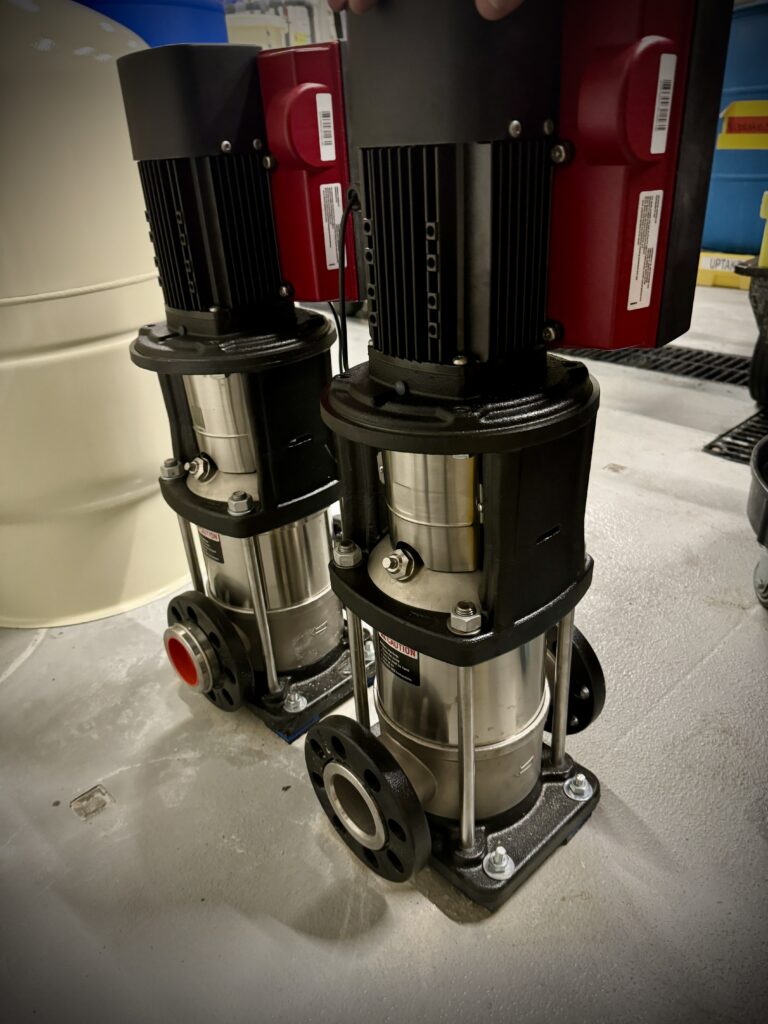Water Pumps for Hydroponic Irrigation

Water Pumps for Commercial Greenhouse Irrigation
At Integrated Water Process, we deliver the best irrigation pumping solutions for your commercial greenhouse or large-scale cannabis indoor grow. Our tailored pumping solutions are engineered and designed for a wide array of fluid transportation applications including fresh water supply, irrigation, recirculation, recovery, and chemical metering to meet the rigorous demands of commercial greenhouses and indoor grow facilities.

Different Pumping Systems and their Benefits
Reliable Freshwater Supply (FWS) Pumps
A reliable pump delivers a continuous freshwater supply that is crucial for commercial hydroponic grow systems, to ensure consistent water delivery to plants. Overall, employing two pumps in parallel for fresh water supply provides critical benefits to a controlled environment agriculture (CEA) greenhouse and indoor grower. The most critical benefit is the enhanced reliability and consistency of the water source to reduce any risk of a failure point in the system.
Dual pump sets also improve efficiency and range of flow in the management of the building’s water supply. With two pumps operating in parallel, maintenance and servicing can be performed on one pump while the other remains operational, minimizing disruptions to the critical water supply to ensure that maintenance activities can be scheduled without disruption to your operations.
Irrigation Water Supply (IWS) Pumps
Irrigation for hydroponic grow systems can come in several forms but ultimately a pump is there to ensure an even water distribution and delivery to your crop. A well-designed and quality irrigation water supply has the potential to optimize water delivered to your crop through the application of precision irrigation resulting in successful crops and positive business results.
With feedback from your crop, climate, or the growing substrate, it is possible to simultaneously improve plant health and yield while reducing fertilizer, additives, and water inputs and associated costs. Automated irrigation recipes, starting conditions, valves, and pumps can be easily controlled and adjusted, providing growers with precise control over the growing conditions for optimal plant growth and development.
Water Recirculation Pumps
Water recirculation pumps are typically used to prevent stagnation in reservoirs or piping systems. These types of pumps should be energy efficient and rated for continuous duty operation and easy to maintain.
- Rated for continuous use
- Reliable and consistent performance
- Energy efficient
- Durable and low maintenance
- Robust and long-lasting
We incorporate these key features into your recirculation pump design to ensure optimal performance and longevity.
Water Recovery Pumps
Water recovery pumps come in many forms depending on the waste stream being recovered. However, typically a reliable recovery pumping system will have speed control capacity allowing for intermittent duty and variable fluctuations in waste streams.
- Variable speed control
- Intermittent usage capability
- Durable and low maintenance
By implementing a customized recovery pumping system, you can effectively manage your waste stream while maximizing efficiency and minimizing environmental impact.

Chemical Metering Pumps
Chemical metering pumps have an array of essential features and benefits, including accuracy, adjustability, chemical compatibility, durability, control options, and safety mechanisms; making them an important aspect in precision fertilizer and additive dosing applications.
- Accuracy in metering pumps leads to reliability, stability, and consistency required to produce a consistently great crop. Chemical metering in hydroponic grow systems enables precise control over nutrient concentrations, ensuring that plants receive the ideal balance of essential elements for optimal growth. The more accurate your metering, the more successful your crop.
- Adjustability of your metering pump allows for control of what and how much is being metered into the respective water process. For example , pump-driven chemical metering allows you to easily adjust nutrient or additive levels based on plant growth stages, environmental conditions, and specific crop requirements, leading to more efficient and sustainable cultivation practices.
- Control options in a metering pump should include both manually adjustable as well as a tunable automatic system to dynamically control the metered flow rates based on sensor feedback. Manual control, or “hand” operation mode, is straightforward and easy to understand, making it ideal for basic hydroponic applications or situations where automation is not required – Think set it and forget it. There are other controls and interfaces that enable precise adjustment of flow rates, allowing for accurate dosing of additives to meet your specific water system requirements.
- Chemical compatibility in metering pumps ensures longevity, reliability, and durability. Chemical metering pumps constructed from materials that are compatible with the chemicals being pumped experience less wear and degradation over time resulting in extended pump life and reduced maintenance requirements, saving time and money for operators. Chemical incompatibility can even become dangerous as it will eventually lead to degradation and release of caustic and volatile water treatment additives.
- Safety alarms should be thoughtfully placed, tested, and validated to provide early warning of system malfunctions when a system is acting outside of its operable bounds. By planning ahead and alerting operators to critical issues promptly, these systems serve to prevent costly downtime and crop disruptions.
Overall, chemical metering pumps play a crucial role in precise dosing applications like water treatment, fertilizer and additives.
Got a question about water pumps?
Contact us today to talk directly to one of our experts and discover how our long-term expertise can help you decide on the correct water pump for your controlled environment agriculture (CEA) facility. Clicking the button below to schedule an appointment.
Why choose the very best in hydroponic water pump technology?
High-quality hydroponic water pumps are integral to the success of commercial greenhouses and indoor cannabis cultivation, providing a range of benefits designed to optimize plant growth and operational efficiency.
The hydroponic pumping solutions that we specify for your application provide precise water and nutrient delivery, ensuring that each plant receives the resources it needs to thrive. This precision simultaneously improves plant health and yield while conserving water and nutrients, making your grow operation more cost-effective and sustainable.
By maintaining an optimal flow rate, our recommended pumping solutions prevent the stagnation of water, reducing the risk of root diseases and promoting the overall health of the hydroponic ecosystem.
We only recommend water pumps that are designed with energy efficiency in mind. Operating at lower power consumption levels without compromising on flow rate or pressure, they help reduce the overall energy costs associated with large-scale hydroponic operations.
Additionally, the versatility of our water pumping solutions means they can be integrated into virtually any hydroponic system setup, from deep water culture (DWC) to nutrient film technique (NFT), with adjustable flow rates and pressure settings to meet the specific needs of each setup.
Let’s talk about water pumps!
Contact our in-house engineering team to discuss your unique needs and discover how our expertise can benefit your CEA greenhouse or cannabis grow facility.
Book a free consultation by clicking the button below to schedule an appointment.
